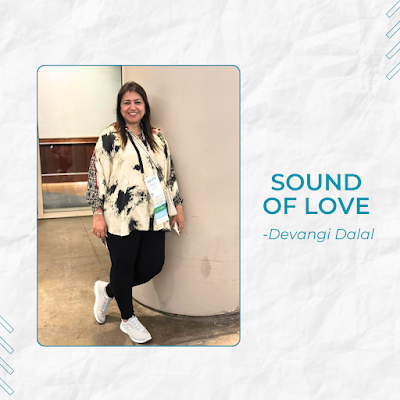Sound of Love....
Sound of Love....
Our human brain hears sound, interprets and understands it, and then expresses it in our own way. This means that if every human being hears the sound of love, everyone will learn to express themselves through their own sound of love. Love has no boundaries, and similarly, the sound of love knows no boundaries either. I feel that love for sound and the sound of love are deeply interconnected. Recently, I have encountered many adult patients with mild to moderate hearing loss who have not fully experienced sound. As a result, their speech is unclear, they lack confidence, struggle with their work, feel different from others, and face many other negative emotions. Those who cannot hear around 95% as others with normal hearing do often miss out on sound in life, and with it, the experience of receiving and feeling love from others. Hearing sound is essential not only for communication but also for spreading love. This is something I have come to understand deeply over the years through my work with hearing-impaired children.
We have heard stories of Lord Krishna mesmerizing people around him by playing the melody of love on his flute (bansuri). He used six different types of bansuris, each with a unique configuration and specific purpose. A standard flute typically has seven notes in Indian classical music (Sa, Re, Ga, Ma, Pa, Dha, Ni) or their Western notes are (C, D, E, F, G, A, B). Additionally, an eighth note is the higher octave (Sa in Indian music or C in Western music), completing the scale. Lord Krishna's flute is often described as encompassing these eight notes, symbolizing divine melodies that connect the earthly and spiritual realms. All his flutes had eight notes, and each note carried its own magic. It is said that when the first note was played, even the meditation of Brahma and Shiva would be interrupted. Upon hearing the first note of the sound of love, Ananta Deva would sway his head in ecstasy. When Lord Krishna played the second note of the bansuri, the Yamuna River would flow backward, as if lost in the sound of love. The third note of the flute would cause the moon in the sky to stop moving, radiating its beauty fully for all beings in the universe to admire. Lord Krishna would play the fourth note of the sound of love to call his cows, who would immediately stop grazing and move toward him, drawn by the enchanting melody.
The fifth note of the sound of love mesmerized the gopis, filling their hearts with devotion and love for Lord Krishna. It allowed them to witness and partake in his divine lilas closely, such as stealing makhan from their homes. Lord Krishna wanted to spread love as the playful child of Yashoda Maiya and as the beloved of the gops and gopis. When he played the sixth note of his flute, even stones would begin to melt, and the autumn season would manifest in Vrindavana. The seventh note of the sound of love, played on his melodious bansuri, brought forth the radiance of all seasons, transforming Vrindavana into a paradise perfectly suited for his divine lilas. The eighth note of Krishna’s flute was dedicated to Radharani, drawing her irresistibly toward him. With this final, enchanting note, he captivated Radha’s heart, immersing her completely in the sound of love, lost in divine ecstasy.
It is said that, apart from Lord Krishna’s six different flutes, he had two more special flutes exclusively for Srimati Radharani. One was called Madanajhankruti, and the other, Sarala, created a soft, melodious sound resembling the call of a cuckoo bird. Lord Krishna used this flute to call Srimati Radharani to join him in his divine lilas. Lord Krishna, also known as Venugopala, Vamsidhara, and Muralidhara, had a deep connection with his flute. It played a central role in all his lilas, as its melodious sound of love was meant to pull the hearts of all his devotees toward him. He kept the flute (bansuri) with him at all times during his lilas to convey a profound message: the sound of love is essential for existing beautifully in this universe.
Lord Krishna, through his stories, has shown that melodious music, faith, and samarpan (dedication) toward God and life create the purest sound of love. One such story involves a vendor who sold chicken and fish. One day, he came across a beautiful shaligram (a sacred stone believed to represent Lord Vishnu). Fascinated by its beauty, he began to care for it in his own way, even using it as a weight on his weighing scale. Miraculously, the shaligram would adjust its weight according to the items being measured. One day, a guru saw how the shaligram was being treated and told the vendor, "This is not just a stone; it is God for us. You cannot treat it this way." Respecting the guru’s words, the vendor stopped using the shaligram for weighing goods. However, from the next day onward, he found himself unable to sell anything. He felt helpless and lost, realizing that faith and reverence were the true essence of his connection to the shaligram. This story reflects the profound idea that devotion and respect for divinity bring harmony and purpose to life, resonating as the true sound of love.
The guru said to the Muslim devotee, “It is good that you have changed the way you practice.” However, the devotee replied, “I am clueless and don’t know what to do now.” At that moment, God appeared and gave darshan to both the devotee and the guru. God said, “Dear devotee, I am moved by your love for me. It does not matter how you express it; what matters to me is the sincerity of your devotion. In today’s world, love is missing. People have no time to pray to me or maintain faith in me. But you, through your actions, have shown the true meaning of love and care. This is the sound of love that I wish for everyone to understand.” This message from Lord Krishna reminds us all that devotion, love, and care hold the highest value, transcending rituals or forms of worship.
We often find ourselves confused about what love truly means. Recently, one of the parents came to us seeking rehabilitation for their two-and-a-half-year-old child. They had traveled from outside India to get help. Their child hardly speaks, and after numerous assessments at different places, they were told that their child might have autism. The moment the word "autism" registered in their minds, they started overthinking, searching on Google, and looking for signs of autism in their child. This heightened their worry and concern, especially because they already have an older daughter and had this son after eight years, making them overprotective. When I observed the child, I noticed that his delayed milestones were likely due to his premature birth, leading to speech and language delays as well. It became clear that the parents’ love and concern for their child had been overshadowed by fear and misinformation, highlighting the importance of understanding and patience when caring for a child. True love, after all, is about acceptance, support, and nurturing growth, even in challenging circumstances.
I advised them to stop focusing on finding faults in their child and instead start playing with him. I encouraged them to simply be parents, enjoy time with their child, and create joyful experiences. Very soon, their child will begin to speak naturally. Recently, I heard a writer and a reputed personality share advice they would give to their child. She said, "I want my child to think in their own way. I want my child to be a good human being. He may not achieve name or fame, but he should remain positive, have a kind heart, be humble, respect others’ feelings, and always be ready to help." Lord Krishna, through the eight notes of his flute, has taught us that the sound of love has the power to transform the world. But when will we truly understand and implement this sound of love in our lives? That remains a question we must reflect upon deeply.











बहुत सुंदर जय श्री राधे कृष्ण
ReplyDeleteA well written blog on the theme’Sound of Love’.
ReplyDeleteIt’s indeed spreading positivity👍
no word , mind, blowing
DeleteAap Ke dwara Likha Gaya Block Hriday ki Sabhi Bhavana ko saralta se Samajhne mein sayak h
ReplyDelete